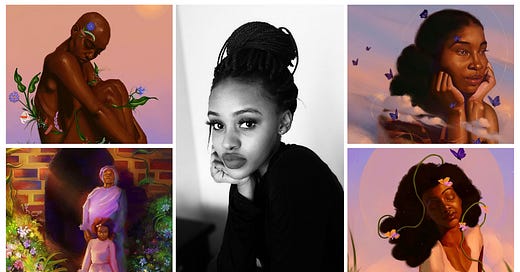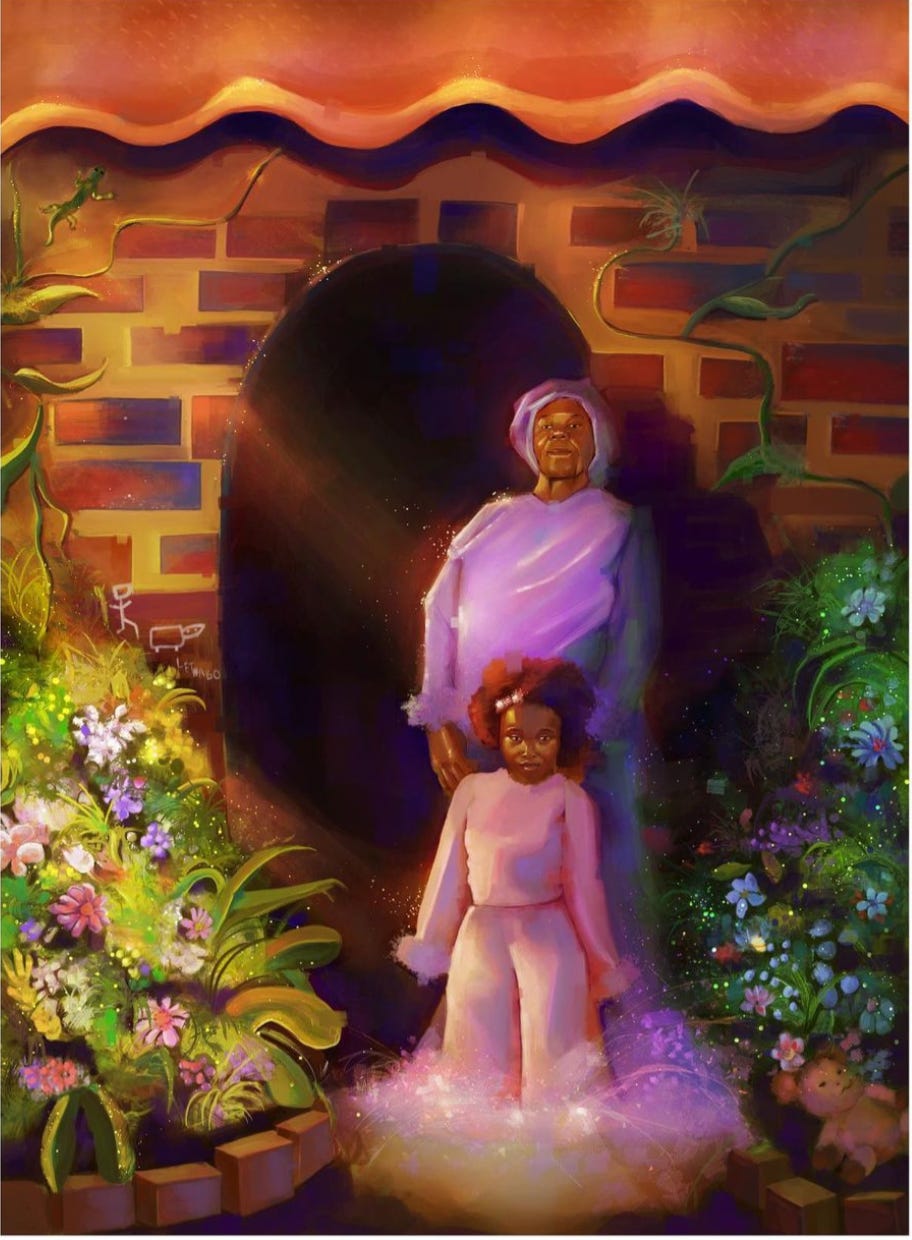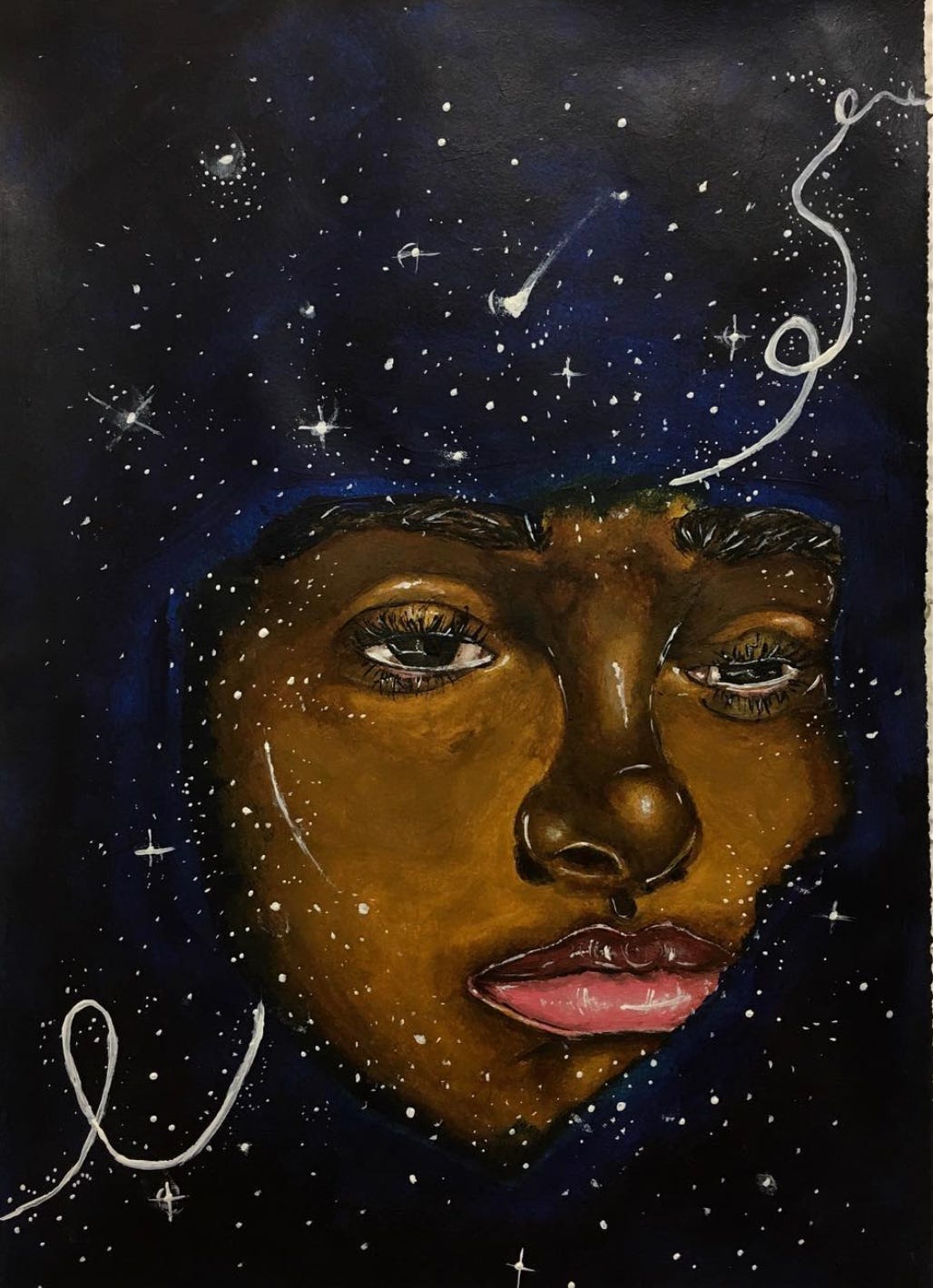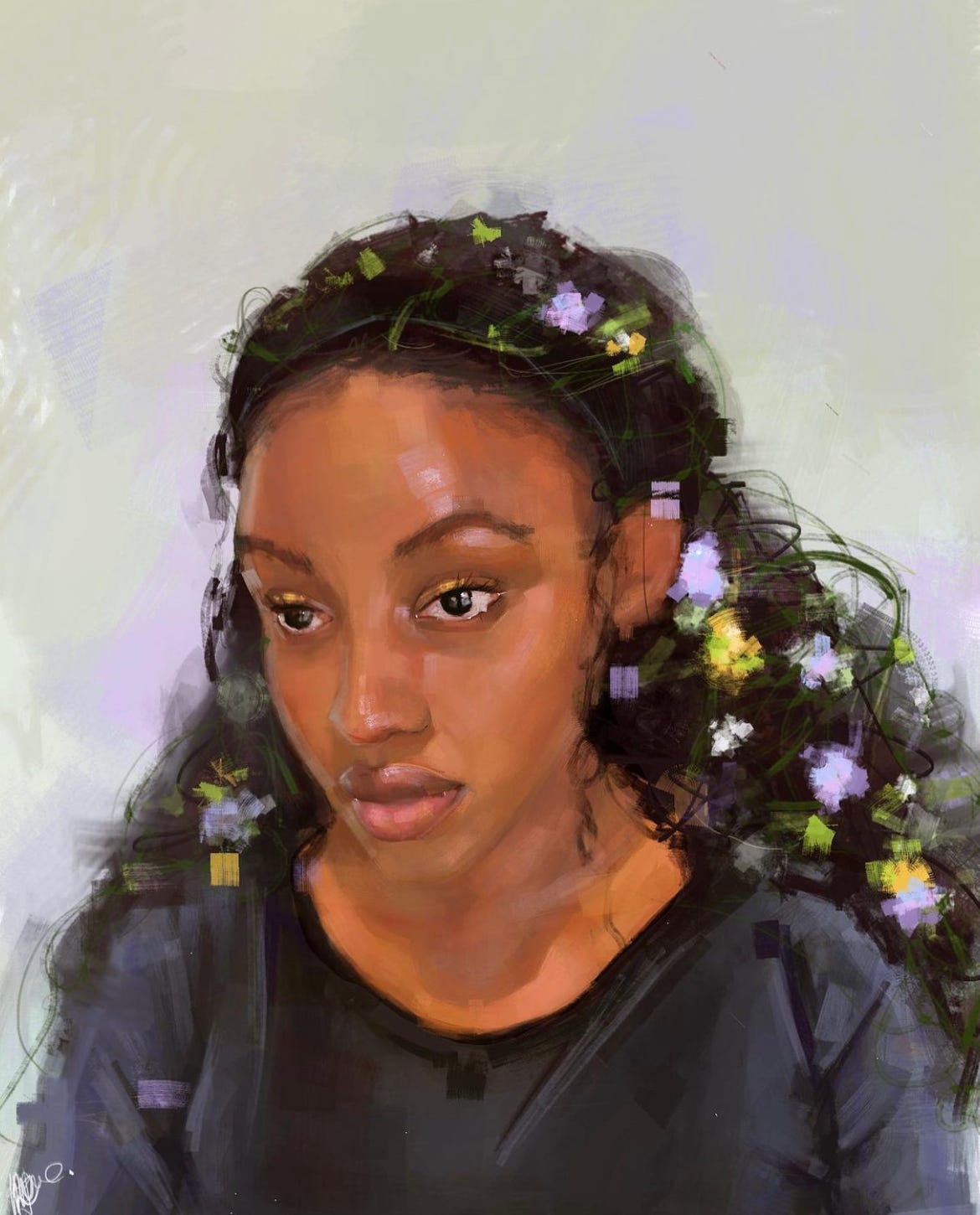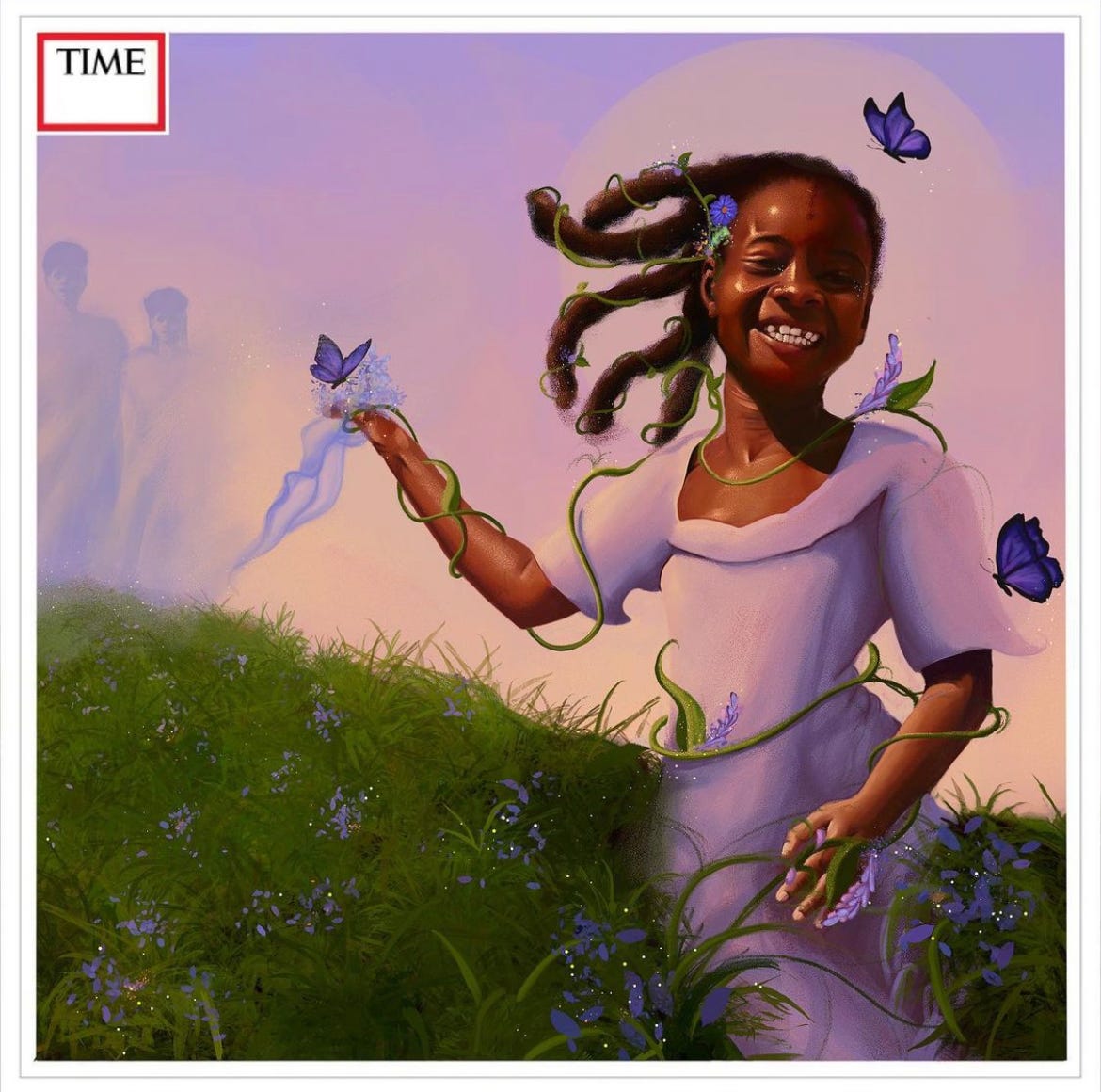#5 - "NFTs helped me choose art" — Lethabo Huma on her artistic phases
A quiet child's search for meaning inspires her art career.
Uncovering the inspiration that shapes an artist’s creative voice and the progression of their art is always interesting. Often, their art reflects their lives, conveying their emotions and experiences.
Lethabo evolved from a prepubescent girl who used the walls of her grandmother’s home as her first canvas to selling NFT art to a growing list of influential clientele.
Through her story, it’s easy to see how influential her upbringing was to her success.
Lethabo’s background
Born and raised in Mabopane, a small township in Pretoria, South Africa, Lethabo spent much of her childhood playing in her grandmother’s garden. A quiet but imaginative child, she learned to use drawing and painting to express herself.
Her mother loved buying her toys, especially dolls, and Lethabo spent a lot of time looking at their faces. What started by experimenting with dolls and cutting the hair off their heads led to her finding her creative voice. But she wouldn’t understand the depths of her childhood experiences until much later in life.
“As far as I can remember, I've always been interested in faces, and I love drawing the sun. Those were the things I drew as a child.” Looking at her work today, it’s easy to see the strong pull she has to faces and the detail she puts into them. “If you doodle a lot and draw faces, it really helps with your drawing and design. Then, you can draw literally anything.”
Art, to a young Lethabo, was more than a hobby or an escape; drawing and painting were second nature to her. She found her way to these tiny scribbles and bold splashes of colour at every chance: during breaks, at the corners of her books, on her desk, or on her grandmother’s walls.
For many years through high school, her art reinforced her colourful imagination and transported her to new worlds. But when it was time to choose a career, instead of pursuing her art seriously as her family expected, Lethabo felt she needed to take a more reliable path.
She reasoned that the way artists were perceived and treated in Africa was not encouraging, and a career in the arts wouldn’t sufficiently cater to the lifestyle she envisioned for herself.
“People don’t have money to buy art and so artists don’t get the support they need. Art is a luxury. As a child, you see artists selling their art on the street and do not envision yourself like that. You’d want to have a nice car and a house.”
As a result, she kept her art as a hobby and looked to the next big thing making waves: computers.
Life in the university
Art might have been her first love, but Lethabo thoroughly enjoyed experimenting with technology. This fuelled her decision to study computer science at Witz University, Johannesburg.
But she soon found out that while it would have been easy for her to do the most with her art, it wasn’t the same with computers. The passion to go all-in was missing, and the drive to be successful at it was low. “A lecturer of mine kept saying that to do well in my course, I had to have a passion for computers. I couldn’t just enjoy it; I needed to go the extra mile.
“If I don’t really feel passionate about something, there is a limit to how much I would actually do.”
That limited drive impacted her ability to stand the rigor needed to excel in school. Worse, it affected her mental health.
Lethabo describes her time at the university as the worst time of her life emotionally. Depressed and enveloped by her sadness, she struggled with different addictions. “I was in a really bad place. It was dreadful, and I was extremely miserable.”
“Those times were really difficult. There were moments when I thought I wouldn’t be happy again. I was so sad, it became my aesthetic, right down to the way I dressed and the music I listened to. I even started to enjoy it.”
At a point where she should have been learning a lot about herself, Lethabo struggled with her development. “I went to schools where you’re trained right down to your personality, and I never really had a personality. I just knew what was wrong and right, and how to act in ways that were acceptable.”
Digital Art to the rescue
Lethabo’s second year at Witz was going the same way as the first—a dark time when she was repeating a lot of her courses—when she decided to go for something that would make her happy.
She turned to art. The one thing that she did not pursue at the outset became the enjoyable thing that served as an escape from the path she chose. “I wasn’t really coping with everything, and I just turned to art.”
What happened next was a string of events that led her to discover the digital art office at her school, and her excitement peaked.
“I met a woman on the digital art side. I told her I was really passionate about art, and she asked to see my portfolio.” Even though Lethabo had no portfolio and didn’t know how to go about getting one, she showed the woman her art on her phone. Her art enthralled the woman so much, “she said she was going to sign me up for the course.”
Not long after she started taking the design course, she bought a used iPad and started experimenting with different digital art software.
Over time, she discovered creators like Alexa Franklin, a digital artist and painter. “I was like, she’s amazing; this is what I want to do.” At the time, Lethabo had been experimenting with sculpture, putting pressed flowers on paper, and traditional Indian forms of art. But with her iPad, she found digital art and software like Procreate. “I started drawing, and I just fell in love with digital art.”
Her joy didn’t last long, however. She was doing poorly academically, and the school management asked her to drop out on account of her poor grades. “School-wise, emotionally, and physically, everything was declining, and I went back home. It was a very stressful time for me, and there was a shame that surrounded the entire situation. I was afraid, but my family was very accepting and supportive of me.”
While she appealed for her academic expulsion to be revoked—an appeal that was not accepted—her mom told her she needed to study something in the art field. She advised Lethabo to take a year to figure out what to do.
“I remember I was appealing to a panel in the meeting, and some lady kept on asking about digital art.” Lethabo’s digital art marks, compared to other courses, were really high, and when asked, her passionate response about it persuaded them she needed to be in digital art.
“That year, I did a six-month course that was more about digital design.” She started posting her art on Instagram and people reached out, asking to commission her to draw them. “I was like cool, maybe I should take this more seriously.”
After a few commissions and in-depth research, she realized there weren’t a lot of digital artists in South Africa, so the information she needed to grow was limited. She started to doubt she could make a career out of it once more until she found African Ginger, an artist with a well-curated page. “I did some [more] research and got my pricing.
By 2020, Lethabo had become a full-blown digital artist.
Getting into NFTs
Lethabo learned to be confident as an artist by being put into situations where she had no other option but to work. “When I came back home from uni, I was lonely.” Her mother had moved out of her grandmother’s house when she was in high school to a very quiet place. “So I had nowhere to turn to but my art.”
She had no money for an internet subscription and found TV boring, so she created a lot of art. “I started getting commissions and understanding what it meant to work with people.” She learned everything on the job, from writing down terms and conditions to negotiating prices and understanding her clients’ needs.
One day, a friend with whom she’d studied computer science told her about NFTs, blockchain, cryptocurrency, and how he believed her work could fit into the ecosystem. “He really helped me with everything, right down to my wallet, understanding phrases, why I needed Metamask, SuperRare and all this other stuff.”
So she did more research, this time about crypto and her role in the space. “I started looking at the different art pieces that were in the space and tried to gauge if the market would accept my kind of art and style.”
Lethabo applied to SuperRare and waited patiently for months for a response. More than three months later, her application was accepted. A team member worked her through using SuperRare and was willing to answer any questions she had, whether or not they were related to SuperRare and NFTs. “It’s one of the things I like about this space: everyone is open and willing to assist. You rarely feel lost. They helped me right down to the piece I should mint first.”
A week or two after she minted her first piece, she got a bid.
Lethabo learned about more African NFT artists in the space, and she reached out to them to ask for tips on pricing and using Super Rare. “I was really nervous when I got my first bid. There were lots of questions. But it’s also a sweet moment because when you do accept the bid, you share your work with someone, and they own a piece of it.”
Strong connections
Lethabo believes strongly in manifestation, and she says that a lot of things she wanted had happened for her. When she first got into the NFT space, like everyone else she didn’t know what she was doing. But the relationships she formed with people helped her achieve some of her dreams.
“I’m a person that struggles with building relationships, but I really like connecting with people. After I joined the NFT space, I was able to connect to international collectors a lot quicker. The number of people that can invest in you is so much larger.” Through this community, she’s also learned to build relationships in the most authentic way possible.
A lot of her first collectors connected her with others, and over time, she’s built a network of wonderful people in the NFT space. “They’ve literally put me in places that I never thought I would be in. Once you know somebody, they might know someone that knows someone and it goes like that. That’s how I met Nica Johnson, the person who nominated me for my Time Magazine feature.”
There is no doubt that digital art and the NFT community is changing the way we see the art community, and Lethabo strongly believes that. Sebastian Smee writes in The Washington Post that NFTs will “revolutionise the existing trading model in the art market, especially for digital art.” Also, this Time piece by Andrew Chow outlines how NFTs are shaking up the art world and how they’re poised to do much more.
For Lethabo, “Any kind of art that is done digitally and sold in the blockchain would really change a lot of African artists’ lives.”
She understands it’s a privilege “for those who are lucky enough to know about this space, to be connected and be online and share information and resources to the rest of the continent. To show artists they can sustain themselves with digital art.”
However, a lot of artists don’t have the luxury to sit and learn a new thing, even if it could change their lives. One clear hurdle is the lack of resources needed to take their careers to the next level.
“There are many people in our continent that don’t have access to basic resources like water and food. Technology is the last thing on their minds. I feel like it’s our responsibility as NFT artists to spread information, get an online presence, share our journeys, communicate with people, and share the information we have. NFTs could really change the living conditions of artists.”
Promoting NFTs
There are many ways for artists to promote their art, one of which is shilling. Essentially a form of crypto marketing, shilling in the NFT world means posting or sharing a link to a project or asset so it can be viewed and potentially purchased.
Nowadays, people online get suspicious of NFT shilling because of influencer-led scams, and it is essential to know how to avoid them. But, there is nothing wrong with promoting NFTs, giving people information, and helping them understand a specific NFT’s value. For Lethabo, shilling has other concerns.
“The thing with shilling is that so many people do it. So, people [might] think you look a little desperate and you don’t value your work. But the value is not in the money, the value is in your work. And that’s what’s really important. People also value your work by seeing how you carry it. When you drop it on everyone’s feed, it doesn’t feel important. That's the problem with shilling.”
Although Lethabo is not a fan of shilling, she understands that there are a lot of artists in the NFT space now, and it’s harder to be seen. “When I joined the space, it was a little bit empty compared to now.” Now, she promotes her work as much as she can by posting on Instagram, using hashtags, and sharing on Telegram, Twitter, Discord, and any other place she can.
Lethabo’s future plans
For 2022, Lethabo has big plans. She is currently working on the second chapter of an art series that excites her. She is also experimenting more with her art. “I’m using Blender for the animated part of it. It’s a lot of work, but I’m really excited for people to see what I did. I’m going to be marketing my art in a brand-new marketplace that is yet to be announced.”
She also plans to document her process of creating art by using Instagram reels, Twitter and TikTok. “I’m kind of nervous about it, but I think it’s going to be fun creating, documenting the process of my art and me as an artist, and connecting to other artists on Instagram and on social media.”
Without a doubt, Lethabo is set to expand her wings and fly into a promising future.
Lessons learned
Lethabo shared five things she’s learned in the NFT space so far:
Don’t take anyone’s word for it.
Be patient.
It’s okay to go off Twitter, especially if it’s an NFT space. I think it’s important because the space gets so overwhelming.
Don’t pocket watch or compare yourself to other artists. Don't do that; you'll just feel more depressed. You are your own artist; focus on yourself. There is so much noise in the NFT space, so have your own road map or plan to navigate the space and follow through with it.
Stay out of Twitter spats. It’s not worth it. Protect your energy. Don’t indulge in a lot of negative things. Sometimes it’s hard not to give someone a piece of your mind but look at things more long-term, especially your reputation.
You can listen to Lethabo’s playlist here.
Thank you:
Esther, for conducting this interview and for pushing me to write.
Ruth for the thorough editing.
Seni for bringing me on board.
Tonye for helping me out (even though he flatly refuses to accept my gratitude).

